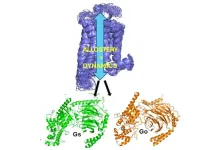(Press-News.org) Regular aspirin may help lower risk of colorectal cancer in people with greater lifestyle-related risk factors for the disease, according to a study led by researchers at Mass General Brigham. The study, published in JAMA Oncology, could encourage a more nuanced approach to preventive aspirin use.
“We sought to identify individuals who are more likely to benefit from aspirin to facilitate more personalized prevention strategies,” said co-senior author Andrew Chan, MD, MPH, Director of Epidemiology for the Mass General Cancer Center and gastroenterology Director of the Center for Young Adult Colorectal Cancer at Massachusetts General Hospital (MGH). Colorectal cancer is the second-leading cause of cancer death in the United States, according to the National Cancer Institute.
The U.S. Preventive Services Task Force previously recommended daily low-dose aspirin to prevent cardiovascular events and colorectal cancer in all adults ages 50 to 59 (the highest risk age group for colorectal cancer). In 2016, they withdrew the recommendation in part due to concerns about aspirin increasing the risk of gastrointestinal bleeding.
For the study, researchers analyzed the health data from 107,655 participants from the Nurses’ Health Study and Health Professionals Follow-Up Study. They compared the colorectal cancer rates in those who took aspirin regularly with those who did not take aspirin regularly. Regular aspirin use was defined as either two or more standard dose (325 mg) tablets per week or daily low-dose (81 mg) aspirin.
Study participants were followed starting from an average age of 49.4 years. Those who regularly took aspirin had a colorectal cancer 10-year cumulative incidence of 1.98 percent, compared to 2.95 percent among those who did not take aspirin.
The benefit of aspirin was largest among those with the unhealthiest lifestyles. Those with the lowest healthy lifestyle scores (unhealthiest) had a 3.4 percent chance of getting colorectal cancer if they did not take regular aspirin and a 2.12 percent chance of getting colorectal cancer if they took aspirin regularly. By contrast, in those with the highest healthy lifestyle scores (healthiest), the colorectal cancer rates were 1.5 percent in regular aspirin-taking group and 1.6% in the non-regular aspirin group. This means that in the least healthy group, treating 78 patients with aspirin would prevent one case of colorectal cancer over a 10-year period, while it would take treating 909 patients to prevent one case for the healthiest group. Lifestyle scores were calculated based on body mass index, frequency of cigarette and alcohol use, physical activity, and adherence to a high-quality diet.
“Our results show that aspirin can proportionally lower the markedly elevated risk in those with multiple risk factors for colorectal cancer,” said Daniel Sikavi, MD, lead author of the paper and a gastroenterologist at MGH. “In contrast, those with a healthier lifestyle have a lower baseline risk of colorectal cancer, and, therefore, their benefit from aspirin was still evident, albeit less pronounced.”
One outcome of the study could be that “healthcare providers might more strongly consider recommending aspirin to patients who have less healthy lifestyles,” said co-senior author Long H. Nguyen, MD, MS, a physician investigator in the Clinical and Translational Epidemiology Unit and Division of Gastroenterology at MGH and a Chen Institute Department of Medicine Transformative Scholar at MGH.
While the study included those who took regular standard-dose (325-mg) aspirin two times a week in the regular-aspirin using category, Sikavi noted that “based on prior studies, the best evidence supports daily low-dose (81-mg) aspirin for prevention.”
Previous studies have found evidence to suggest aspirin can reduce the production of pro-inflammatory proteins, known as prostaglandins, that can promote the development of cancer. Aspirin may also block signaling pathways that cause cells to grow out of control, influence the immune response against cancer cells, and block the development of blood vessels that supply nutrients to cancer cells. “Aspirin likely prevents colorectal cancer through multiple mechanisms,” Chan said.
The study did not assess potential side effects of daily aspirin use, such as bleeding. In addition, while the study tried to control for a wide range of risk factors for colorectal cancer, in comparing non-aspirin and aspirin-taking groups with the same level of risk factors, because this was an observational study, it is possible there may have been additional factors that influenced the findings.
Authorship: In addition to Sikavi, Chan, and Nguyen, Mass General Brigham authors include Wenjie Ma (MGH), David A. Drew (MGH), Shuji Ogino (BWH), Edward L. Giovannucci (BWH), and Mingyang Song (MGH). Additional authors include Kai Wang and Yin Cao.
Paper cited: Sikavi, D et al. “Aspirin Use and Incidence of Colorectal Cancer According to Lifestyle Risk” JAMA Oncology DOI: 10.1001/jamaoncol.2024.2503
###
About Mass General Brigham
Mass General Brigham is an integrated academic health care system, uniting great minds to solve the hardest problems in medicine for our communities and the world. Mass General Brigham connects a full continuum of care across a system of academic medical centers, community and specialty hospitals, a health insurance plan, physician networks, community health centers, home care, and long-term care services. Mass General Brigham is a nonprofit organization committed to patient care, research, teaching, and service to the community. In addition, Mass General Brigham is one of the nation’s leading biomedical research organizations with several Harvard Medical School teaching hospitals. For more information, please visit massgeneralbrigham.org.
END
About The Study: Between 14 and 27 weeks’ gestation, novice users with no prior training in ultrasonography estimated gestational age as accurately with the low-cost, point-of-care artificial intelligence (AI) tool as credentialed sonographers performing standard biometry on high-specification machines. These findings have immediate implications for obstetrical care in low-resource settings, advancing the World Health Organization goal of ultrasonography estimation of gestational age for all pregnant people.
Quote from corresponding author Jeffrey ...
About The Study: Aspirin use was associated with a greater absolute reduction in risk of colorectal cancer among individuals with less healthy lifestyles in this cohort study. The findings of the study suggest that lifestyle risk factors may be useful to identify individuals who may have a more favorable risk-benefit profile for cancer prevention with aspirin.
Corresponding Authors: To contact the corresponding authors, email Andrew T. Chan, MD, MPH (achan@mgh.harvard.edu) and Long H. Nguyen, MD, MS (lnguyen24@mgh.harvard.edu).
To access the embargoed study: Visit our For The Media website at this link https://media.jamanetwork.com/
(doi:10.1001/jamaoncol.2024.2503)
Editor’s ...
About The Study: In this purposive national survey study of clinicians providing abortion, moral distress was elevated among all clinicians and more than twice as high among those practicing in states that restrict abortion compared with those in states that protect abortion. The findings suggest that structural changes addressing bans on necessary health care, such as federal protections for abortion, are needed at institutional, state, and federal policy levels to combat widespread moral distress.
Corresponding Author: To contact the corresponding author, ...
About The Study: This cross-sectional study found that universal background checks alone were not associated with firearm homicide rates, but a permit requirement for the purchase and possession of firearms was associated with substantially reduced rates of firearm homicide. The findings suggest that combining universal background checks and permit-to-purchase requirements is an effective strategy for firearm-related fatality reduction.
Corresponding Author: To contact the corresponding author, Michael Siegel, MD, MPH, email mike.siegel@tufts.edu.
To access the embargoed study: Visit our For The Media website at this link https://media.jamanetwork.com/
(doi:10.1001/jamanetworkopen.2024.25025)
Editor’s ...
Houston, Texas, July 24, 2024 – The Texas Heart Institute, a globally renowned cardiovascular health center, announced today that Joseph G. Rogers, MD, President and Chief Executive Officer for The Texas Heart Institute and Adjunct Professor in the Division of Cardiology at Duke University, has been appointed by the American Board of Internal Medicine (ABIM) to its Cardiovascular Board for a three-year term beginning July 1, 2024.
“I am honored to have been appointed to this esteemed group ...
A clinical trial at Oregon Health & Science University suggests that a subset of older adults with a genetic predisposition to Alzheimer’s disease may benefit from fish oil supplements.
The study published today in the journal JAMA Network Open.
The results come amid claims that fish oil supplements can improve brain function in people with memory problems. The study found no statistically significant benefit for all older adults in general. However, among those enrolled in the study who also carry a gene associated with Alzheimer’s disease, it showed a reduction in the breakdown of nerve cells in the brain.
The study’s senior co-author from OHSU ...
In a groundbreaking study, a multinational research team led by Dr. Adnan Sljoka (RIKEN) and Prof. Akio Kitao (Tokyo Tech), in collaboration with Prof. Scott Prosser (University of Toronto), has carried out experimental and computational studies to elucidate the mechanisms behind G protein selectivity and efficacy in the human adenosine A2A receptor (A2AR). A2AR is a member of major drug targets G protein-coupled receptor (GPCR) superfamily, which engages the G protein and initiates cell signaling, influencing heart health, inflammation, cancer, and brain diseases. Scientists have ...
Fewer side effects, improved chances of healing: the goal of precision medicine is to provide patients with the most individualized treatment possible. This requires a precise understanding of what is happening at the cellular level. For the first time, researchers at the Technical University of Munich (TUM) have now succeeded in mapping the interactions of 144 active substances with around 8,000 proteins. The results could help to identify previously unknown potential benefits of existing drugs.
Practically all drugs either affect, produce or eliminate proteins – or are, in fact, proteins. But what exactly happens when a high or low dose is taken? And what is going ...
Companies and institutes are currently working on biotechnological processes for the production of dairy products without the use of cows: In so-called precision fermentation, egg and milk proteins are produced with the help of bacteria, yeasts or other fungi. This results in foods such as milk or cheese with a familiar flavour and texture. Supporters hope that this will lead to more sustainable food production, as nutrient-rich proteins can be produced using fewer resources. But will consumers accept such products? Researchers at the University of Göttingen have found that a large proportion of German consumers are willing to try and buy cheese produced in this way. ...
TAMPA, Fla. — Researchers constantly seek innovative approaches to tackle cancer. One concept gaining traction is antifragility, a property where systems not only withstand stress but improve because of it. In cancer research, this concept is particularly relevant for tumors that adapt and evolve in response to treatment. Understanding antifragility could lead to more effective therapies. In a new study published in npj Complexity, Moffitt Cancer Center researchers offer a new perspective on antifragility, proposing ...


